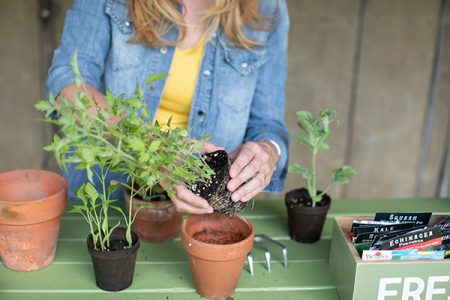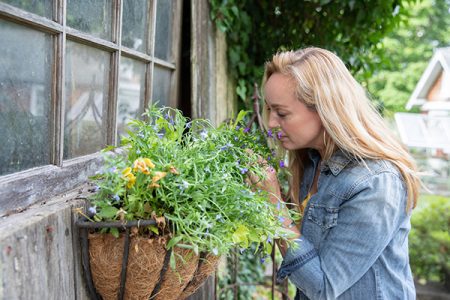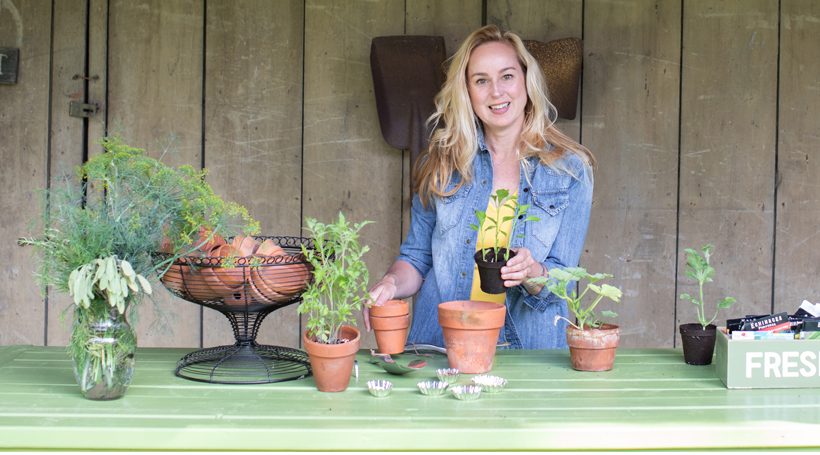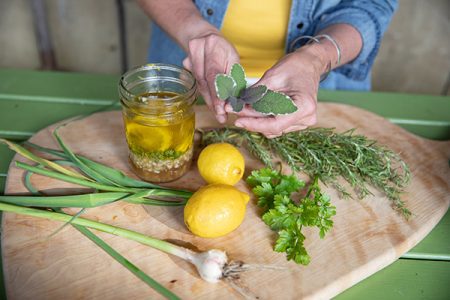Photography: Susan Hennessey
This summer, SJ Magazine began a Facebook video series following SJ Magazine’s Marianne Aleardi as she attempts to become a gardener – something she has never done before. She is being helped along the way by Toni Farmer, who has absolutely gardened before and has proven she is patient and kind working with gardening beginners (we can’t emphasize “beginner” enough).
And while Toni has lavish gardens to prove she’s the right person for the job, she also has a master’s degree in Environmental Sustainability from the University of Pennsylvania. Together, the two are determined to grow some plants and vegetables, and have some fun in the process. Below are some of Marianne’s gardening questions for Toni.
To watch “The Goal is to Become a Gardener” with Toni Farmer and Marianne Aleardi, visit SJ Magazine’s Facebook page.
Q: How do you know so much about gardening?
My mom taught me a lot when I was a kid and then when it became my passion, I started reading everything I could get my hands on. I experimented every year with everything in the garden. I’ve had more failures than you could possibly imagine, but that’s how we learn. I got to the end of what I could learn on my own, so I went and got a master’s degree.

Q: For beginners in South Jersey, are there plants we should start with?
I love beans as a starting place because everyone likes green beans, and they’re really easy to grow. All of the varieties of lettuce are also great for beginners because they don’t require a lot of work and it’s a short growth cycle.
Q: Are there certain plants and vegetables that do better because of our soil?
We are the garden state – this is our thing. Everything grows well here. The better question is: What can’t you grow here? That would be anything that fits into the citrus category, avocados, things that are tropical – you can’t really grow those here unless you bring them inside. You’ll have challenges off and on with everything, but with just a little trial and error you can grow anything here.
Q: If you’re planting something, how do you determine if you should plant in the ground, a raised bed or a pot?
It’s up to you as a gardener and what your goal is. Maybe you don’t have a place to plant in the ground or don’t want to commit to a whole raised bed, having some pots on your patio is a great way to start until you know this is for you. Most things can go in a pot, it just is a matter of different care. When you plant in the ground, they have access to water all season long – to the point where after they establish a root system, you barely have to water. A pot is going to dry out in the heatwaves we have, sometimes you may have to water twice a day.

Q: How does someone learn how often to water?
Some of it is trial and error like anything else we do in life. But some of it is super obvious, too. If your plant in your pot looks sad or the pot soil looks super dry, try to stick your finger in to see if there’s moisture underneath.
Q: Are there any plants where it’s ok if they’re dry?
There are some plants that actually like to be dry at some points in their lifecycle. I’m growing quinoa this year which likes to have regular water when it’s established, but when it’s setting those seeds that become quinoa, it prefers a dry soil. If you’re planting in the ground and you have watered well in the spring and you’ve mulched, it’s ok to water very little now.
Q: What is the correct method for getting a plant out of a pot?
Here’s a pretty tried-and-true rule: Don’t ever grab a plant by the stem or even the leaves. I know it’s so tempting to do that but grab the base of the plant. Sometimes you’ll need a spade to dig a little circle about the same diameter as the plant and gently lift that out.
Q: With a raised bed, do I have to worry about chipmunks or squirrels?
Every season is different. I’ve never had a chipmunk issue in my 24 years of living in Moorestown, but this year they’re everywhere. That’s a normal part of gardening. People want every season to be the same and they’re not. Weather patterns or what’s happening in your ecosystem can change the habitat for animals. What you have to keep in mind is: a hungry animal is going to come after your food, period. I have dozens of methods that range from sprinkling cayenne pepper in the soil to fencing and traps.
Q: We’ve had some heavy rain and harsh winds. What should I do to protect what’s in the bed?
If you have tall plants like tomatoes or sunflowers, you will need some kind of support. Many stores sell all kinds of stakes and things to hold them up. Regarding the soil, depending on the shape of your lawn and the way water runs off, sometimes the water will carry off nutrients from the soil, so I usually fertilize after a big rain.
Q: What’s the difference between mulch and compost?
Mulch is a blanket term that means anything we put down to protect our soil. It could be cardboard, newspaper, straw – anything that does two things: traps water underneath and prevents some weeds from growing. Compost is the breaking down of organic materials into dirt, which is amazing for your plants. It’s full of microbiome, great fungus and bacteria, all the elements and nutrients that make your plants grow.
Q: When do you plant tomatoes?
I plant them the first week of March in my house, because they have a long cycle and I want them to be growing and producing tomatoes in my yard for the longest period of time possible. I don’t want to waste April, May and June starting little seedlings. So I start them inside and then I transplant them outside in spring.
Q: What’s your favorite thing in your garden?
I’m going to be a New Jersey gardener and say tomatoes. A tomato that you grow in your garden tastes nothing like what you buy in the grocery store. I say put it on a slice of bread with some mayonnaise and a little salt, and it’s the world’s perfect food.
Click here to watch “The Goal is to become a Gardener” with Toni Farmer and SJ Mag’s Marianne Aleardi.
Toni’s Magic Marinade
You’ll need:
garlic, 4-5 cloves
several sprigs of rosemary, sage & parsley
2 lemons
olive oil, 1/3 cup
apple cider vinegar, 2 tbsp
salt and pepper
mild cherry (or peppadew) peppers, 4 or 5
4 chicken breasts
a meat malletTo make the marinade, zest the skin of one of the lemons into a mason jar (or whatever container you’re using). Squeeze all of the juice from that lemon into the same container. Add 1/3 cup of olive oil and 2 tbsp of apple cider vinegar. Next use a garlic press to mince 4-5 cloves of garlic. You can substitute canned, chopped garlic but really…it’s just not the same.
Chop all the herbs and add them. Just grab a big handful and use a knife or scissors to chop it all up and drop it in!
Add a teaspoon of salt and a dash of pepper. Add some peppers. I usually dice 4-5. Finally, cut the remaining lemon into thin slices, about 1/4 inch, and toss them in.
Now to make the magic happen!
Put each chicken breast in a disposable plastic grocery bag (or two sheets of butcher paper) and use the meat mallet to pound them until they are about 1/2 inch thick and even. Put them in a container and add 3/4 of the marinade, saving the rest for later.
You can marinate for a few hours, but they’ll be even better if you let the marinade sit overnight.
To cook the chicken, heat your grill or a cast iron skillet to high heat and cook for a few minutes on each side until cooked through. At the same time, throw the lemon slices on the grill or in the pan and let them caramelize a bit. When you serve the chicken, drizzle a little of the remaining marinade on top (not the part you used on the raw chicken!) and serve with the cooked lemon slices and whatever vegetable side dishes you are serving from your garden.















